An intro to animal ethics
My attempt to summarize everything important I believe about animal ethics
Contents:
Ways you can help end factory farming without becoming vegan
Arguments against veganism that I do not take seriously but hear a lot
Introduction
In this post, I’ll argue that animal welfare matters and that we need to end industrial animal farming. I’m not trying to convince you to become vegan, but I am trying to convince you that industrial animal agriculture is such a drastic moral emergency that you should do whatever you can to reduce the number of animals in factory farms. If I could convince you to take one action after reading this, it’s to set up a recurring donation to an effective animal welfare charity, which will probably have a greater positive impact on animals than becoming vegan.
I won’t argue that it’s wrong to hunt animals or to raise them for food on traditional family farms. I will argue that it’s wrong to inflict so much suffering on an animal that it becomes preferable for the animal to have never been born, and that it’s wrong to cause more animals to be born into lives with this level of suffering. 98% of animals farmed for food in the United States are in factory farms, not family farms, and most factory farms seem involve this level of suffering.
This chart shows the percentage of farmed animals in factory farms (not traditional farms) split up by species:
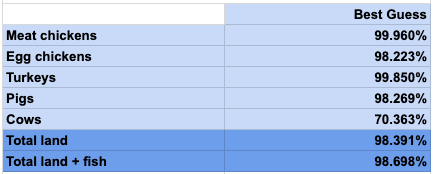
Americans eat 10 billion factory-farmed animals each year. My arguments will be framed around chickens because almost all factory-farmed land animals are chickens. The diet of the average American causes about 2200 chickens to go through life in factory farms in total. It causes a chicken to go through 50 days of life on a factory farm for every 15 days of the diet.
Number of animals the average American will eat in a lifetime:
Linear scale graph of yearly global chicken slaughter (note: graph is not cumulative):
Logarithmic scale:
I made a website here that shows each chicken currently alive in a factory farm in the United States as one dot on the main page.
Throughout this post, I’ll use the word “torture” to describe what’s happening to animals on factory farms. This isn’t meant to say that the animals are constantly being intentionally harmed, but it seems like the only word that gets across how bad their lives are as a whole. “Extreme suffering” gets across something similar but I find it more clunky.
I’m not trying to trigger an emotional reaction. I don’t have much emotional reaction to animals. I’ve never had a pet in my adult life. I also don’t have an emotional reaction to the idea of people from Milwaukee. However, if something I were doing were causing people from Milwaukee to be tortured, I would stop doing it. We have a responsibility to not torture animals regardless of whether we have an immediate emotional reaction to them.
Because I’m not trying to trigger an emotional reaction, I won’t show any images from factory farms or go into any detail about how bad they are. I’ll just ask that you accept my claim that they are so bad that it would on average be better for the animals inside them to not exist. If you found out that your pet was going to be taken away to live on a factory farm for the rest of their life, and you would choose to put it to sleep instead of letting it experience that, you agree with me.
Why it’s wrong to cause animals to suffer
Animal suffering is bad
You meet a stranger who has been in an accident. Their brain was damaged, and their mental capacities were reduced to the level of a chicken’s. Would it be acceptable to torture them? No.
I think of chickens as beings like me who happen to have fewer mental capabilities than I do. Like the stranger, they have each been in a terrible accident: they were born with chicken-level minds and chicken bodies. It’s wrong to torture a chicken in the same way that it would be wrong to torture the stranger.
Does it make sense to think of chickens this way? Humans feel many complex forms of suffering and wellbeing that chickens can’t experience, like the fear of nothingness that comes after death, or the pleasure of a good conversation with a friend. However, other more basic forms of well-being (like physical comfort, satiation, affection, belonging to a social structure, nurturing, etc.) and suffering (like physical pain, discomfort, isolation, fear, etc.) may be experienced by both species. If chickens can experience basic forms of suffering and well-being similar to humans, then a chicken mind is similar to the stranger whose mental capabilities have been lost, and torturing a chicken is about as bad as torturing the stranger. It is very possible that chicken experience is nothing like human experience, but that does not necessarily mean it cannot be good or bad. We could imagine plugging a human into a chicken’s mind, so for a few minutes the human experiences things from the perspective of the chicken, and forms memories of what it is like. When they reawaken, they could be asked if it was a good experience and if they would want to do it again. It seems pretty likely that the human could report that some of the experiences were good and others were bad, even if the experiences were nothing like what humans normally have.
Most people accept this argument as valid, but they do not accept the premise that chickens can experience suffering and well-being. The popular belief is that chickens are basically robots without internal experience, so it’s not good or bad when chickens suffer. This belief is probably wrong. The Wikipedia page on animal consciousness is a great summary of the current scientific debate, which leans strongly in favor of chickens and other animals we farm having at least some meaningful form of conscious experience. A majority of professional philosophers polled report that fish are probably conscious, and chickens have more complex brains and social systems than fish. Because the expert consensus seems to be that chickens have conscious experience, torturing a chicken is likely about as bad as torturing the stranger.
What if I’m wrong and chickens are unfeeling robots? There’s no way we can be sure of this, so we need to think about how to act when we’re uncertain. I would guess that the odds are about 30% that chickens are unfeeling robots. That means that if I buy animal products, there is a 70% chance that I’m contributing to the torture of beings like myself. That’s unacceptable. Imagine you have two options:
Option 1: You eat a tasty meal, and a person rolls a 10-sided die. If the die lands on a number between 1–7, they torture a person with chicken-level cognitive abilities for a day. If it lands between 8–10, no one is tortured.
Option 2: You eat a slightly less tasty meal, and no one is tortured.
How low would the odds need to be for you to feel okay about taking the chance? 50%? 20%? For me, it would need to be below 1%. We do not currently have nearly enough certainty about animal consciousness to make the mass torture of chickens a morally acceptable risk to take.
Which other species should we be concerned about? It seems that any animal with a brain and ability to suffer deserves our moral concern. This includes fish. People are sometimes surprised to find out that I think fish welfare matters. Fish are especially alien and not relatable to us. I think these are emotional gut reactions that hide the reality that fish can also suffer. Torturing a person with the mind of a fish seems wrong to me. I am not too concerned about traditional fishing since it’s a small amount of pain relative to the fish’s total life, but 70–85% of the seafood Americans eat comes from farmed fish rather than wild fish, and there are good arguments that farmed fish suffer more per kilogram of meat produced than any other animal.
Some people believe that it is not bad to harm animals that cannot form memories because as soon as the suffering stops the animal is unaffected. I think this is wrong. Imagine you were told that tomorrow you were going to be tortured, and then immediately after your memory would be completely wiped, and it would be as if the torture never happened. How worried would you be? Would you be correct to be worried? I would personally worry and think that I would be correct to be worried. It would be bad even if I did not remember it after. We don’t remember our lives after we die, so by the same logic, it would also be acceptable to harm humans because at some point in the future, they will no longer remember the harm.
There is a lower limit of nervous system development below which animals cannot meaningfully be said to suffer because they have so little experience of pain and well-being, so they do not merit our ethical concern. Oysters and other shellfish probably fall into this category, so it does not seem like there is any ethical problem with farming and eating them. A person with the mind of an oyster would effectively be dead, so it would not be possible to harm them. It seems extremely unlikely that chickens are anywhere near this lower limit.
We have a responsibility to not cause animals to suffer
Some argue that we only have moral responsibility to our species, regardless of how much suffering other species can feel. I think this is wrong. There’s no clear boundary between species and no clear reason why the boundary would be morally relevant. A thought experiment: we meet a human whose DNA has been slightly altered, so instead of a mouth they have a beak. It would not be any more acceptable to torture this person. The wrongness of harming them did not decrease at all. We could change the person’s brain so that they have the mind of a chicken. As with the accident victim, it does not become acceptable to torture the person. It might be that this person did lose some morally relevant qualities. For example: we can no longer harm them by insulting them or denying them human social status, because they won’t understand either, but we can still harm them by causing them pain. The drop to chicken-level mental capacities removes this person’s ability to feel certain forms of well-being and suffering, but it does not drop the badness of harming them to zero. We could make it impossible for them to reproduce with humans; one of the basic barriers between species. Again, this does not make it okay to harm them. We could add feathers, chicken feet, and other chicken traits. There is no clear change we could make along the spectrum from human to chicken that would make it acceptable to harm this person, so it seems that the boundary between species does not matter ethically.
Some philosophers used to argue that we can only have moral responsibility toward rational beings who can themselves make moral decisions. This is clearly false. If this were true, it would be morally acceptable to harm babies or people who cannot form abstract thoughts. We have moral responsibility to beings who are not rational enough to have moral responsibility toward us.
We probably don’t benefit animals by farming them
For me, the most convincing ethical argument in favor of animal agriculture is that we benefit animals by bringing them into existence. The argument goes like this:
We are not only responsible for the suffering we cause farmed animals. We are also responsible for all positive experiences they have, because without us the animals would not have been born in the first place. Buying animal products creates an economic demand to create more animals. If the animal lives are more good than bad, creating more is a good thing, so we should buy animal products.
I completely agree with the premise of the argument, but don’t believe it works as an argument for animal agriculture as it exists now, because the suffering of factory-farmed animals so clearly outweighs any fleeting comfort they may have, and 98% of animal products come from factory farms. If we lived in a world where the well-being of farmed animals outweighed their suffering, I would support animal agriculture. We don’t and are so far from that world that it seems preferable to aim to economically demand as few animal products as possible to ensure that the least animals are tortured.
In the graph below, let’s imagine that each unit on the scale represents an amount of wellbeing and suffering that can be traded-off against each other. This is obviously a silly simplification and I’m only using it to make a very specific point. In this case, Life 3 involves so much suffering that there isn’t enough wellbeing to make up for it and make the life good overall. In human terms we could imagine someone being tortured for their whole lives, and receiving a single ice cream cone at the end. I would not want to live this life and think it would be bad to create more people who would have that life. I would support animal agriculture if most farmed animals were in Life 1 or Life 2, but 98% of farmed animals are almost definitely in Life 3.
We cannot measure the exact well-being and suffering of factory-farmed animals, but we need to guess what their overall lives are like to think about whether it is acceptable to bring them into existence. One easy test is to ask what we would want for ourselves. If I were given the choice between being born a factory-farmed animal or not being born at all, the choice seems obvious to me. I would choose to never be born. Another more reasonable test may be to ask what level of suffering a pet would need to go through for us to choose to euthanize them. Most pet owners need to make a choice at the end of their pet’s life about whether the animal’s future experience will be so bad that it would be preferable for the pet to not exist. If I found out that my pet was going to go through the experience of a chicken on a factory farm, I would choose to euthanize it, because non-existence would be preferable to that level of suffering. I would pay a lot of money and sacrifice a lot of time to make sure my pet never experienced a factory farm. I do not think this is just an emotional reaction. I think this reaction is a rational assessment of what the world is actually like that overrides my emotions. Most pet owners at the time they put their animals to sleep have an emotional desire to keep their pets alive, but they use reason to override their emotions because they understand that it would be wrong to allow a conscious being to suffer at extreme levels for the rest of its life. Most people believe that an animal’s life can be so bad that non-existence is preferable, and it seems very likely that the lives of most factory-farmed animals are this bad. Thus, we do not benefit most farmed animals by bringing them into existence, and the ethical argument for producing more farmed animals fails.
What about wild animals?
A common objection to animal welfare arguments is to bring up wild animals:
Animals in the wild also suffer, sometimes to an extreme degree where their lives are net negative. Factory farms play a very small role in the total animal suffering in the world, and we obviously cannot save all animals in nature from suffering, so we do not need to worry about the welfare of animals in factory farms. Because there is so much suffering that cannot be fixed, we may not need to worry about animal welfare at all.
I think this is wrong for three reasons.
The first reason is that if we are mainly worried about terrestrial vertebrate animals, nature basically does not exist compared to animal agriculture:
The second reason is that no matter how much suffering already exists in the world, more suffering is still bad. Could the current level of human suffering in the world make it acceptable to torture a person, because the person’s suffering would be tiny compared to the total of human suffering? The question seems ridiculous. More suffering is still bad, no matter how much suffering is already happening. No matter how many animals are suffering in nature, torturing even more is still extremely bad.
The third reason is that the suffering of wild animals can still be very bad even though we have much less control over it. People worry about the implications of animal welfare arguments because they assume we would also need to worry about animals in nature. I do believe that the suffering of animals in nature is also bad, but also that we do not have any clear way of making their lives better right now, outside of small interventions. If we imagine humans in thousands of years with technology so advanced that they could remove the experience of suffering from animals in nature without harming the natural systems required to keep us alive, it seems silly to not think this would be an amazingly good event. The reason I focus on farmed animal welfare is only because it is much easier to end a lot more suffering there without disrupting natural systems. This article is a good introduction to the problem of wild animal suffering.
A rule for when it’s acceptable to harm an animal
I follow a simple rule for how to treat animals:
It is only acceptable to cause an animal to suffer when the action causes more total wellbeing for animals than suffering.
Here are 5 situations and how I interpret them using the rule:
Hunting animals to prevent overpopulation: This is a quick hit of pain, but also prevents many more animals from experiencing much more painful forms of death from starvation and other bad results of overpopulation. It might also save the animal from having a more painful death in the wild. It robs the hunted animal of future potential wellbeing, but because the animal population is kept stable there will be roughly the same amount of animals experiencing wellbeing in the long-term, so on net, it probably does not take away wellbeing. It seems to decrease the total suffering of animals significantly, so it’s very good.
Torturing wild animals: This is worse than anything a wild animal would normally experience, and does not do anything to benefit the animal or other animals. It’s clearly wrong.
Raising animals on traditional family farms, treating them well, and allowing them to die natural deaths: This causes a lot of animal well-being and relatively low suffering. It’s very good.
Raising animals on traditional family farms, treating them well, and painlessly killing them for food: This gives the farmer economic means and incentive to raise more animals with good lives and a quick painless death, so more well-being results from this than not selling them for food, so it’s preferable to letting them die natural deaths.
Factory farming: Extreme amounts of suffering for the sake of generating enough revenue to fund processes that will cause a lot of future animals to also go through extreme suffering. Worse than anything else on the list by a wide margin.
While some of these are moral and some aren’t, 98% of animal products come from factory farms, so the relative morality of the others seems unimportant.
How big of an ethical problem is animal welfare?
If my beliefs are correct, about 10 billion conscious beings like us, who happen to have less capacity to reason and form abstract thoughts, are being put through extreme suffering by humans each year in the U.S. alone. I see this as morally equivalent to America torturing 10 billion humans each year who each happen to have chicken/cow/pig/fish mental capacities. This is an unimaginably large ethical emergency and seems to demand a response from everyone. It is not just one small ethical problem among many.
Ways you can help end factory farming without becoming vegan
You do not need to be vegan to have a positive effect on animals. The movement for animal welfare being associated with a specific and very restrictive diet is a giant problem, because it’s a barrier to more people getting involved. Purity does not matter, reducing animal suffering does. If I could convince 1,000 people to become vegan, or 10 people to donate $100 a year to an effective animal charity, I’d probably choose the latter. Money in the right places can do a lot more good than you can as an individual consumer. That being said, I do think veganism is an effective way to combat factory farming (explained below) but here are other highly effective options:
Donations: Donating to the right places is the single most effective way you can help animals. Many animal charities do not do much good with the money they receive, but the most effective animal charities can have massive effects on animal agriculture. As you can see in the image below, there is currently a massive asymmetry between where animals are suffering and which animal causes Americans are donating to:
Charities working on reducing the number of factory-farmed animals need a lot more funding than they are currently getting. Animal Charity Evaluators aims to find which charities are the most promising for permanently changing the food system and ending factory farming. You can donate to their Recommended Charity Fund and they research where to distribute the money to have the biggest impact on animals. To put my money where my mouth is, I appear in their 2022 Top Donors list.
Being vocal: Most people do not know that factory farming accounts for 98% of animal agriculture, how bad it is, or that animals probably have levels of consciousness that have moral value. Being vocal in your community about the reality of animal agriculture is an important step to enacting animal welfare policies and behavior changes.
Non-vegan dietary changes: If two people reduce their animal product consumption by 50%, that has similar effects to a single person reducing their consumption by 100%. Similarly, the moral difference between eating animal products 1 time per week and 0 times per week is about the same as the moral difference between 2 times per week and 1 time per week. If there are certain animal products you just can’t give up, don’t give them up, but try to reduce how much you eat others. There is a large difference between how much suffering different animal products cause. Grass-fed beef cows may lead net-positive lives, whereas egg-laying chickens probably suffer more than any other land animal. If you cannot give up all animal products but want to reduce suffering the most, stop eating farmed fish, eggs, and chicken, but continue to eat beef and milk. This sounds silly, but I know several “beef vegans” who will eat beef and no other animal products. It’s extremely important to emphasize that replacing meat with eggs as a source of protein leads to much more animal suffering. If you want to reduce suffering, you should replace eggs with meat. (source) This is a common and harmful mistake people who care about animals make. Not eating fish, eggs, and chicken reduces animal suffering by 90% compared to veganism’s 100% (source).
Careers: You can use your career to help end factory farming. This is a good overview of careers in animal welfare.
Why veganism is an effective way to support animal welfare
Effects of veganism on animals
I will not stop animal farming by being vegan, but I can still stop a lot of individual animals from suffering in factory farms. There are multiple ways to think about how many animals we can each have an effect on by going vegan:
View 1: A single individual buyer has basically no effect on supply chains as complex as animal agriculture. Whether I buy animal products does not affect how many animals get tortured. Being vegan does give other people a strong signal that I care about animal welfare, which may cause them to care about animal welfare too. Still seems like a win, but a small one.
View 2: Each person who does not buy animal products is casting an economic vote to stop producing them and to produce more plant-based alternatives. Each vote may not tip the scales, but we are collectively responsible for collective wins and can divide the wins by the number of people voting to get a sense of our effect. 10 billion animals are factory-farmed in the United States each year. Dividing by the population gives us about 28 animals factory-farmed per person. If we all stopped eating animal products, the 10 billion animals would not be factory-farmed, so each person could be said to save 28 animals per year from being factory farmed. This means that each person who goes vegan now could also meaningfully be said to save 28 animals per year from being born into constant torture, even though the actual numbers may be very random and different.
View 3: We are only responsible for systems that we participate in and support. You are only responsible for the actions of a group of people if you are a part of that group. If you stop eating animal products, you have washed your hands of the ethical problem of animals and it becomes other people’s problem. The moral problem of animal suffering no longer exists for you.
I agree with View 2 because of my beliefs about ethical philosophy. A lot of strange ethical problems appear if we do not divide consequences by the number of people causing them.
Why not eat eggs and milk?
Eggs probably cause much more suffering per calorie than any meat product. Factory-farmed chickens lay 250–300 eggs per year living in brutal conditions. Each egg represents between 1 and 2 full days of torture.
If I wanted to harm animals the least, I‘d much rather eat a 1000-calorie steak dinner than a 1000-calorie omelet. A person switching from a carnivore to a vegetarian (but not vegan) diet could easily cause much more animal suffering than they had been before if they substitute meat with eggs. If I had the choice between convincing people to give up meat or to give up eggs, I would ask them to give up eggs. Milk seems to require less suffering than meat and eggs, but it is still so much suffering that I could not consider buying it, and it contributes much more to climate change than milk substitutes.
This website has a fun rough calculation of which animal products we should avoid based on our relative concern for animal welfare vs. climate change.
Why not eat ethically sourced animal products?
Would it be bad to raise animals for meat if they lived their whole lives happy on a farm, were well taken care of, and at the end were suddenly and painlessly killed for meat? I do not think this would be bad at all. Many animals do not seem to have enough of a conception of themselves or their future to make it inherently bad to painlessly kill them, as long as killing them does not upset their families or companions. Similarly, forms of hunting where the animal dies a quick, painless death and the hunter keeps the animal population low enough to not be an ecological problem do not seem to be bad at all. If anything, they prevent animals from suffering a more painful death or the consequences of overpopulation.
Should we eat animals raised with happy lives? I have three caveats and two problems with this:
Caveats:
A lot of meat produced outside of factory farms still involves a lot of suffering, to the point where the animals’ lives may not be worth living.
If all meat were completely ethically produced, the supply would be drastically lower and meat would be much more expensive.
The only thing harder than requesting a vegan option at every social event is requesting 100% ethically sourced animal products at every social event.
Problems:
Ethically sourced meat still contributes to climate change, and in many cases contributes more than factory-farmed meat. Cows raised on grass produce significantly more methane than cows raised on feed.
98% of animal products in America come from factory farms. Eating the 2% of meat that does not come from factory farms still sends a social signal that eating animal products in general is acceptable. Imagine that there was a popular brand of hat where 98% of the hats were made by torturing people from Milwaukee. You are concerned about this, and so you make sure to buy the 2% of hats made by ethically treated people from Milwaukee. The hat you buy is indistinguishable from the torture hats, but you know it is ethically sourced. You wear it in public and people see you wearing it, and you see a lot of people wearing the torture hats. You blend in with them. When people ask, you make sure to say that your hat is ethically sourced. It seems like this would be kind of silly. Wearing the ethically sourced hat still seems like a social endorsement and normalization of the hats as a whole, and almost all of them are torture hats. In the same way, when we eat ethically sourced meat, we may socially normalize meat in general more than we realize, and because almost all animal products involve torture, this is a problem.
Climate change
Animal agriculture contributes significantly to climate change, and you can cut your dietary carbon footprint by about 50% by going vegan. Cows produce methane, which absorbs about 80x as much energy from the sun as carbon. Many people have trouble believing that cows could have a significant effect on the environment because they do not see many cows. The reason why cows can have a large effect on the environment is because there are a lot of them. The biomass of cows is currently four times the size of the biomass of all vertebrates that existed 12,000 years ago.
Is it better for the climate to buy local than it is to buy vegan because shipping produces much more CO2 than the ways we produce food? Absolutely not. For whatever reason this idea has caught on in a lot of climate spaces despite being false, as shown in the graph below.
Locally raised meat is much worse for the environment than vegan food shipped from the other side of the world.
I think all the above arguments are correct and worth taking seriously, but I have to admit that climate change has zero effect on how much meat I consume. I try to reduce my emissions where I can, but my vegan diet is entirely motivated by animal welfare, not climate. A few months ago I took an international flight, which has the same carbon footprint as the emissions I saved being vegan for multiple years. While climate change is important to me and I believe that veganism helps with it, my identification with veganism starts and ends with ending factory farming.
Veganism and health
Being vegan and tracking your nutrients allows you to live a normal healthy life. It could be that eating certain combinations of animal products is significantly more healthy than veganism. I could accept that. My motivation for veganism is entirely based on animal welfare and climate change, and as long as I can be normally healthy eating a vegan diet, I am happy.
A lot of people worry about protein. I was personally able to put on a lot of muscle on a vegan diet where I tracked my nutrients. It would have probably been a little easier eating meat, but I did not have much trouble. The consensus seems to be that plant protein is slightly less bioavailable than animal protein, so you should just eat a little more of it to balance out. I do worry about new vegans not eating enough protein. While it is nearly impossible to develop an actual protein deficiency on most normal vegan diets, getting high amounts of protein helps people feel full after a meal, and not feeling full is a big reason why new vegans go back to eating animal products, so I encourage vegans to make sure they are eating enough protein-rich foods.
Vitamin B12 does not occur naturally in vegan diets, and vegans have to take supplements for it. B12 is essential. Going without it for too long can cause permanent nerve damage. The fact that vegans have to use supplements to be healthy is sometimes used as an argument that the diet is by definition not healthy. I think this is wrong for two reasons. The first reason is where the average person’s B12 comes from. Humans in nature used to get a lot of their supply of B12 from eating dirt (their food was not very clean) as well as consuming animals that also received B12 from the dirt. Because humans no longer consume dirt, all the B12 we consume comes from animals who do consume dirt. Or at least it used to. Almost all the animals we eat do not consume much dirt at all, because they are factory farmed and eat special feed. Because they also need B12, they eat feed fortified with B12 supplements. In both cases, B12 is being unnaturally supplemented, it is just coming to us in different vehicles. The second reason is that an unnatural diet is not necessarily unhealthy. Most weightlifters I know supplement protein with powders and are significantly healthier than many people I know who do not use protein powder.
Suffering is not all that matters
I focus a lot on suffering in this essay, but I do not want to imply that eliminating suffering is the only thing that matters in animal ethics. The promotion of wellbeing also matters (good arguments for this are found in this essay by Toby Ord) and it would be strongly ethically preferable to have a world of happy animals as compared to a world with no animals at all. It may be that one day we will live in a world where humans raise all animals in a happy state where their lives are worth living, painlessly kill them for meat at the end of their lives, and do not contribute to climate change. We are so far from that world right now that complete abstention from farmed animals seems like the only viable option for improving animal welfare.
Arguments against veganism that I do not take seriously but hear a lot
We are at the top of the food chain and should eat animals because we ‘won’ evolution and are the dominant species.
Evolution is not a god, it is a label for the coincidence that more genetically viable species also happen to reproduce their genes more. It gives us no useful information about what is ethically right to do. If we want to obey evolution, our first step should be to have as many children as possible or to violently attack other humans as potential competitors for resources. I am not planning to do that and do not see many other people doing that either.
Plants have feelings too!
I do not think so, but even if they do, plants need to be grown to feed animals raised for meat, and animals require a lot more calories from plants than the calories the animals themselves produce. Eating meat causes more plants to be killed than veganism does.
Animals like mice and snakes and bugs are killed in the process of harvesting plants for vegan diets, so no diet is truly vegan.
To repeat the above point, animals require a lot more calories from plants than the calories the animals themselves produce. Eating meat causes more plants (and the animals who die in the farming of the plants) to be killed than veganism does. I do not think it is wrong to kill certain animals as long as the death is painless, but plant farming may still involve a lot of painful animal deaths that it would be preferable to avoid.
The end goal
What would a morally acceptable food system look like? In my ideal world, animals would be farmed to the extent that they had lives filled with enough comfort and well-being to be worth living and contribute positively to the broader food system and environment. This could easily include raising animals humanely for food. Strict laws would make current factory farming conditions illegal. 98% of animal production as it exists now would not exist. Real meat would be much more expensive, and most people would get most of their protein from healthy meat alternatives: either lab-grown meat, alternative proteins, fake meat, or plants. This is a utopian goal in the sense that it would be drastically better than our current world, but not utopian in the sense that it is already technologically and socially possible. This is a problem of individual choice and collective economics and culture that can be fixed. Our goal as people who know that animals have moral worth should be to hasten progress toward this goal and to reduce the number of animals tortured along the way as much as possible.



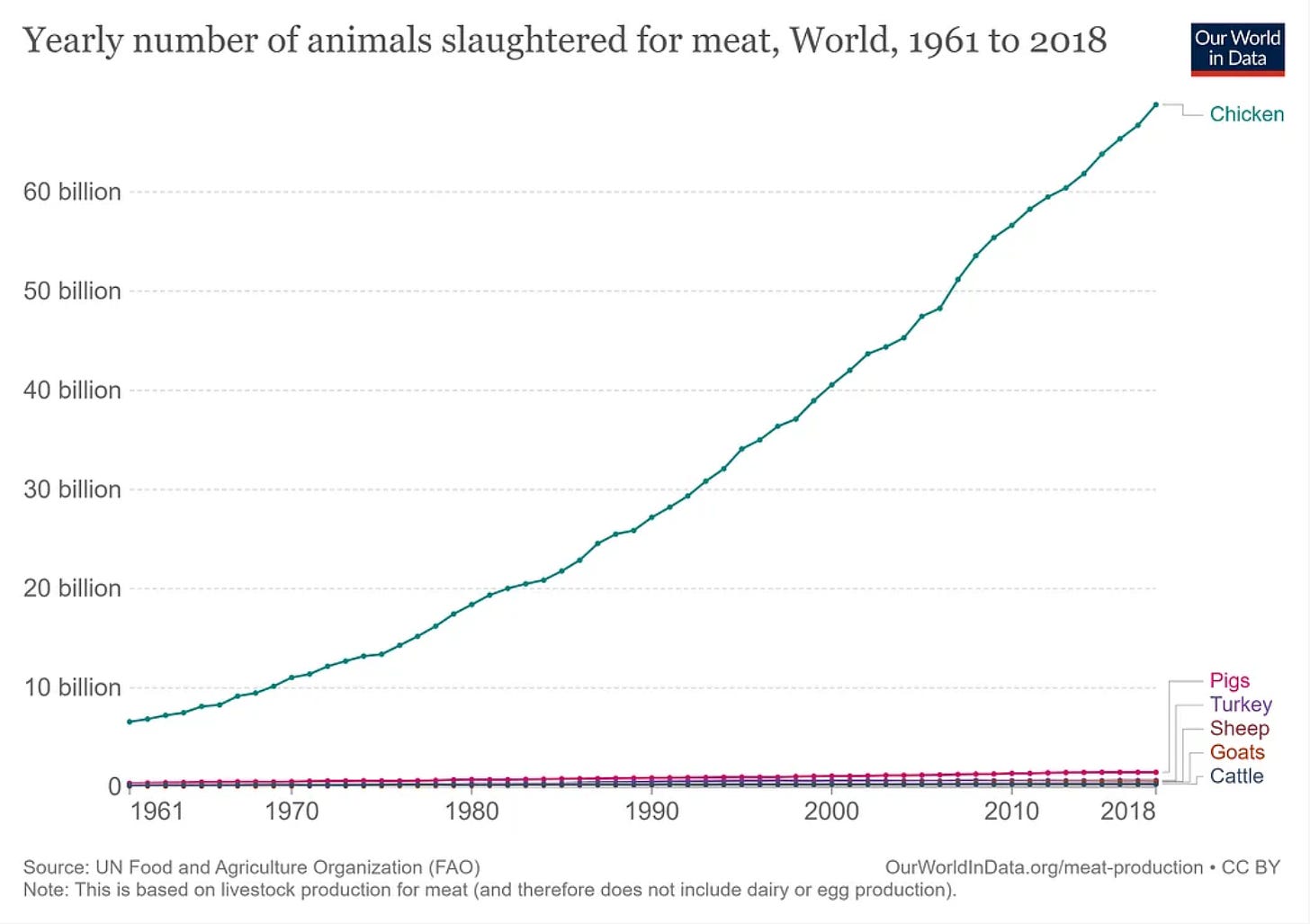
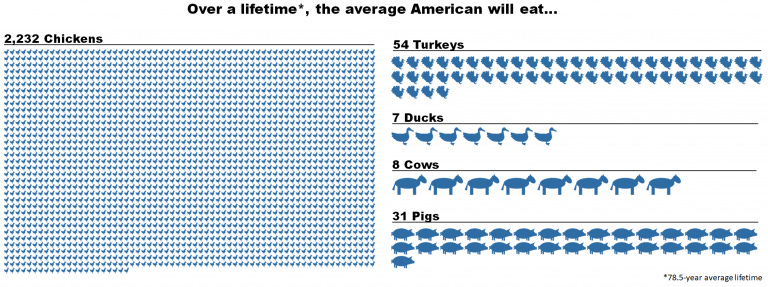
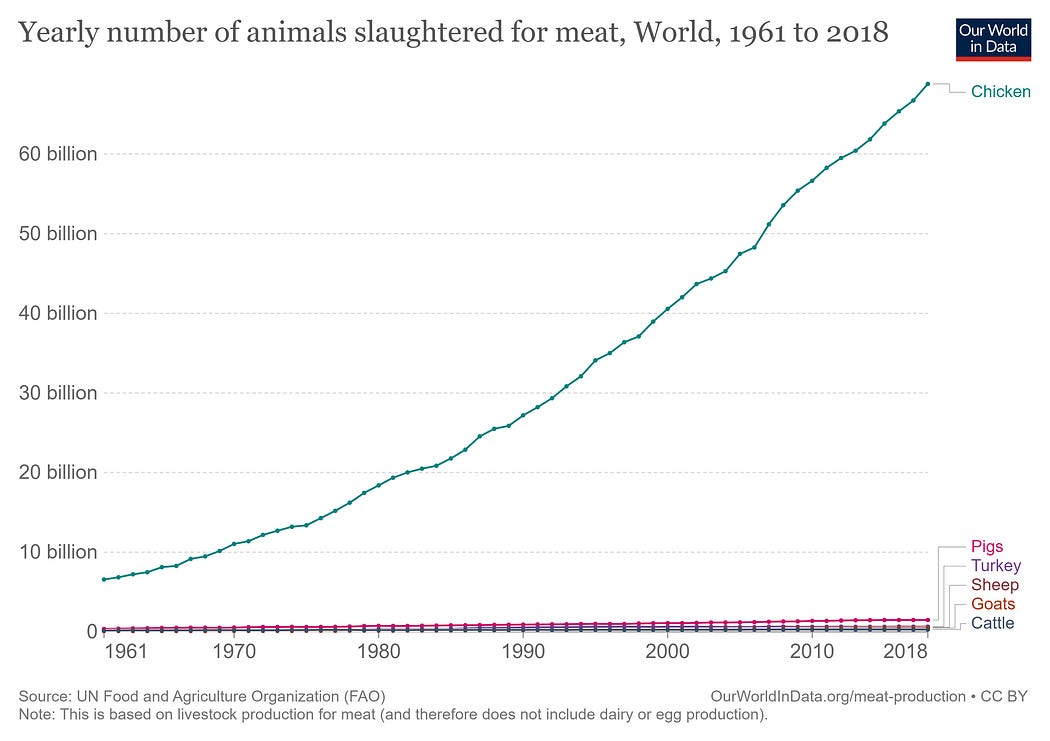
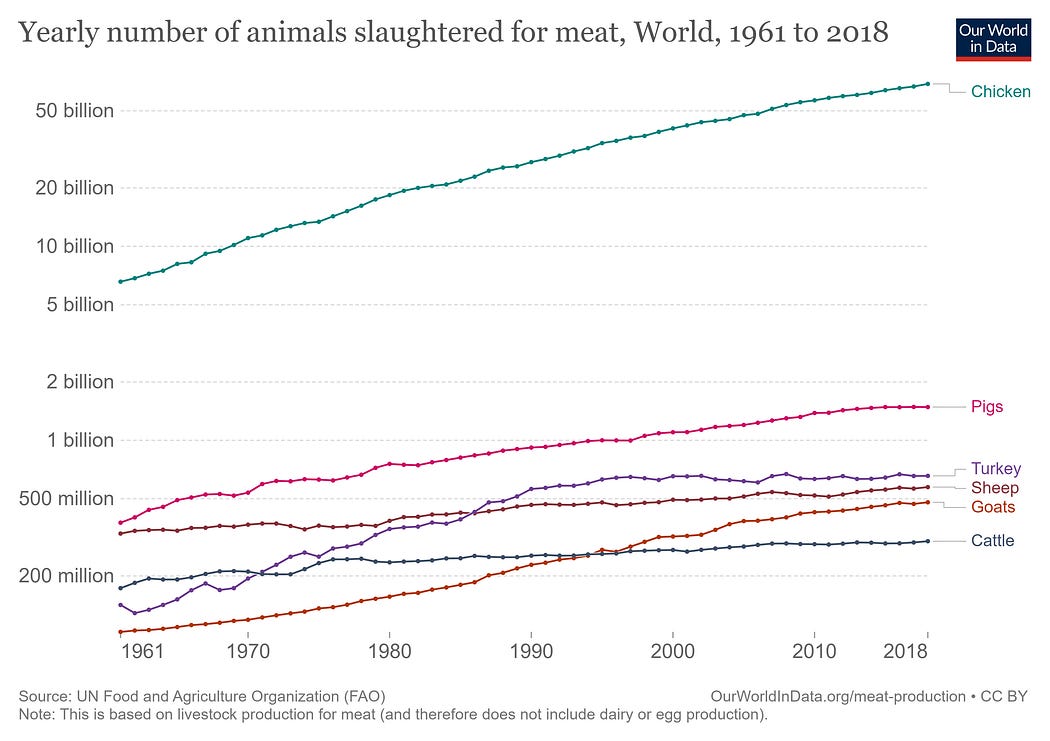
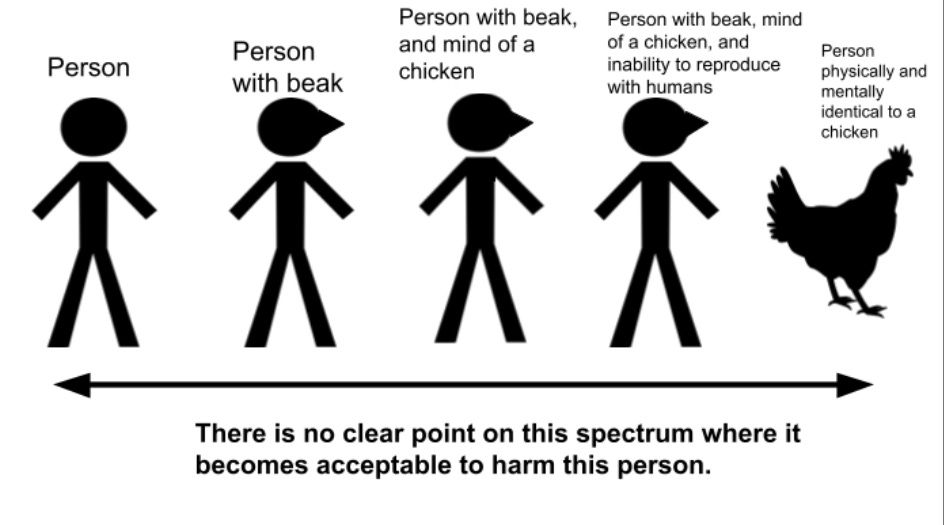
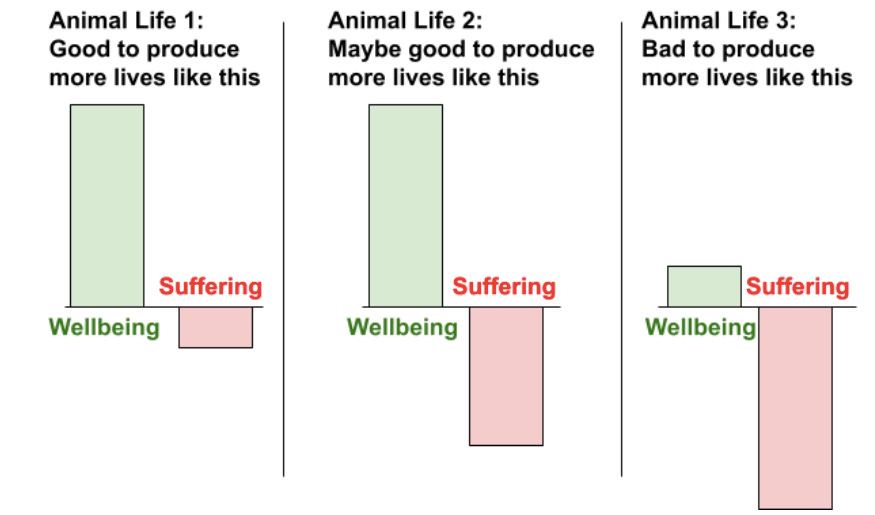

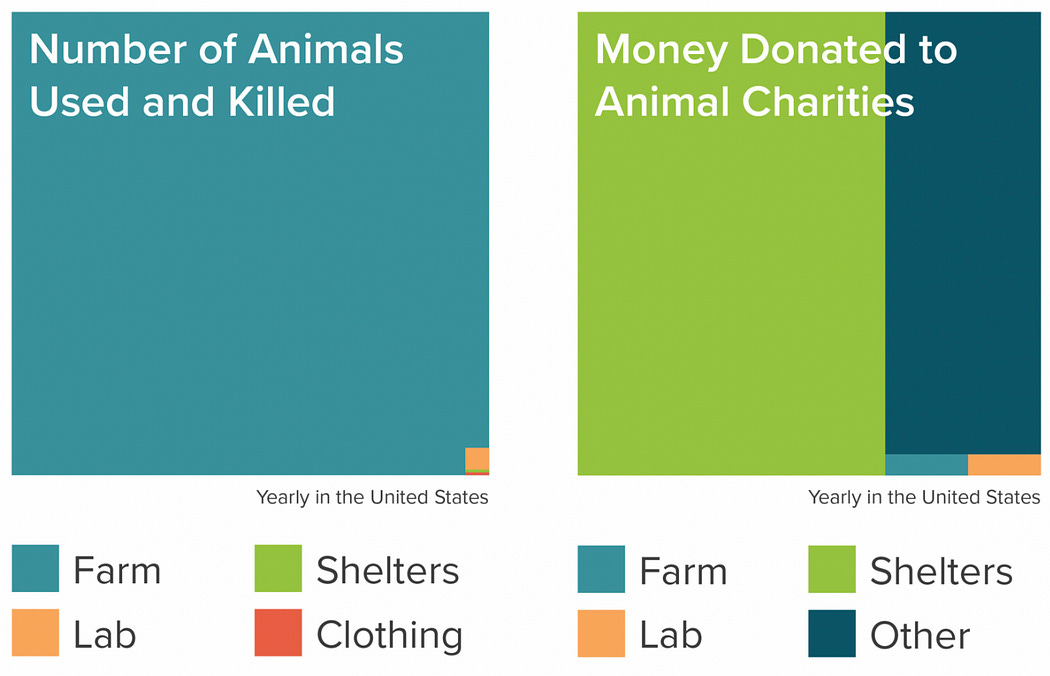
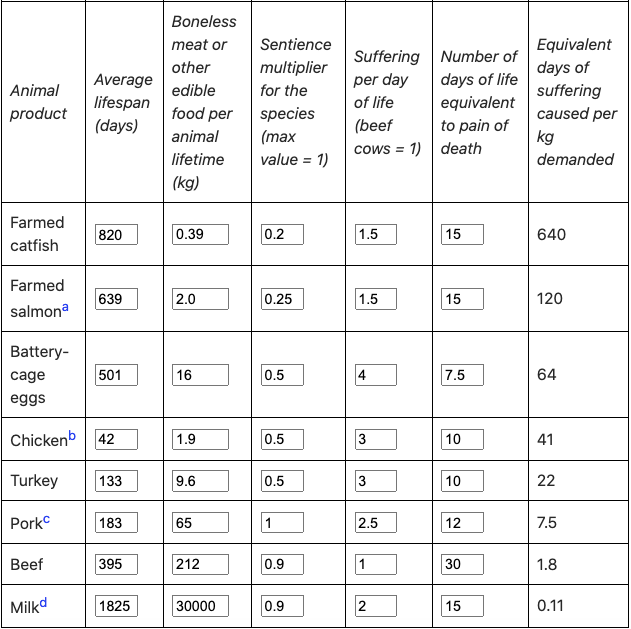


Thanks for the post, Andy! I think increasing the consumption of animal-based food is beneficial. It decreases the number of soil nematodes, mites, and springtails via increasing cropland, which is among the biomes with the lowest density of those animals, and my best guess is that they have negative lives (with probability 58.7 %, 55.8 %, and 55.0 %; I am very uncertain). I estimate School Plates in 2023, and Veganuary in 2024 harmed those animals 5.75 k and 3.85 k times as much as they benefited farmed animals (https://forum.effectivealtruism.org/posts/Rjutj7Jd2v2KHvDyA/cost-effectiveness-accounting-for-soil-nematodes-mites-and).
"The first reason is that if we are mainly worried about terrestrial vertebrate animals, nature basically does not exist compared to animal agriculture"
Biomass is not the best proxy for the absolute value of welfare. Based on the relationship between Rethink Priorities' mainline welfare ranges, and neuron counts, I calculated soil nematodes, mites, and springtails have (in expectation) a welfare of -4.36*10^-6, -1.57*10^-5, and -2.35*10^-5 QALY/animal-year (https://forum.effectivealtruism.org/posts/Rjutj7Jd2v2KHvDyA/cost-effectiveness-accounting-for-soil-nematodes-mites-and). I also estimated they have an annual welfare of -296 k, -13.9 k, and -10.4 k times that of humans.
"The second reason is that no matter how much suffering already exists in the world, more suffering is still bad."
I very much agree. However, I think more factory-farming decreases global suffering due to decreasing the suffering of wild animals much more than it increases the suffering of farmed animals.
"The third reason is that the suffering of wild animals can still be very bad even though we have much less control over it."
I agree, but I would say we have control over it to a significant extent. I believe it is currently very difficult to change the welfare per wild-animal-year, but wild animal welfare can also be improved by decreasing negative wild-animal-years. For my best guess that wild animals have negative lives, I think this can be achieved by increasing cropland, such as by extending human lives, and therefore increasing food consumption (https://forum.effectivealtruism.org/posts/Rjutj7Jd2v2KHvDyA/cost-effectiveness-accounting-for-soil-nematodes-mites-and).